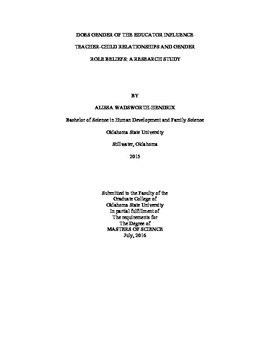| dc.contributor.advisor | Williamson, Amy C. | |
| dc.contributor.advisor | Tate, Amy | |
| dc.contributor.author | Wadsworth-hendrix, Alissa Dawn | |
| dc.date.accessioned | 2017-02-22T22:16:50Z | |
| dc.date.available | 2017-02-22T22:16:50Z | |
| dc.date.issued | 2016-07-01 | |
| dc.identifier.uri | https://hdl.handle.net/11244/49177 | |
| dc.description.abstract | The field of early childhood education is a primarily female-dominated occupation with a very small occurrence of male early childhood professionals in the classroom. This presents a potentially problematic issue considering the current concern about boys being in crisis during their early school years. Specifically, it is often questioned whether these struggling students would perform better for same-gendered educators. The purpose of the current study was to understand whether or not gender of the educator influences the relationships they have with the students in their classrooms. Additionally, educators� attitudes and beliefs about students� traditionally gender-normed behaviors were also measured to see if this was related to the gender of the educator. In the current study, three one-way ANOVAs were conducted, along with paired sample t-tests, in order to determine if there were any associations between educator gender and the closeness/conflict of their relationships with students, and if their gender was related to their beliefs about gender roles. The first ANOVA examined differences in teacher-child closeness, which was broken down into four categories to capture child gender and positive/challenging (i.e., male positive, male challenging, female positive, female challenging). Results indicated that for positive relationships with female students, female educators reported significantly higher closeness than the male educators reported. The second ANOVA examined differences in teacher-child conflict, which was broken down into the same four aforementioned categories; results for challenging relationships with male students indicated that female educators reported significantly more conflict than male educators. The third one-way ANOVA revealed no significant differences between male and female educators in their views of traditional and non-traditional gender-normed behavior. Collectively, the findings from this study suggest that there are some salient differences in the relationships male and female teachers form with their students. | |
| dc.format | application/pdf | |
| dc.language | en_US | |
| dc.rights | Copyright is held by the author who has granted the Oklahoma State University Library the non-exclusive right to share this material in its institutional repository. Contact Digital Library Services at lib-dls@okstate.edu or 405-744-9161 for the permission policy on the use, reproduction or distribution of this material. | |
| dc.title | Does Gender of the Educator Influence Teacher-child Relationships and Gender Role Beliefs: A Research Study | |
| dc.contributor.committeeMember | Cole-lade, Gretchen | |
| osu.filename | WadsworthHendrix_okstate_0664M_14778.pdf | |
| osu.accesstype | Open Access | |
| dc.description.department | Human Development & Family Science | |
| dc.type.genre | Thesis | |
| dc.type.material | text | |
